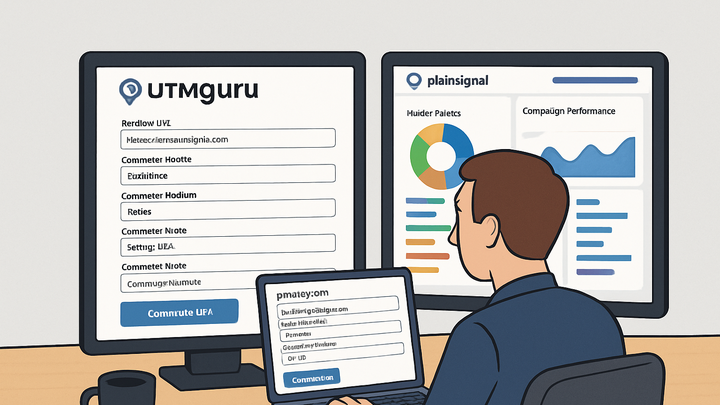Published on 2025-06-29T18:34:12Z
What is a Custom Campaign? Examples, Tools, and Best Practices
Custom Campaigns in campaign tracking & analytics are specialized URLs tagged with parameters that
allow marketers to measure the performance of individual marketing initiatives. By appending UTM (Urchin
Tracking Module) parameters such as utm_source, utm_medium, and
utm_campaign to links, you can attribute incoming traffic to specific campaigns, channels, or
creative elements. Tools like utmguru.com simplify the process of building, managing, and storing UTM
URLs, while analytics platforms such as Plainsignal capture and report on these parameters in a
privacy-focused, cookie-free manner. Custom Campaigns provide actionable insights into which marketing
efforts drive the most engagement, conversions, and ROI. Implementing a consistent tagging strategy
ensures data accuracy and enables teams to make data-driven decisions across digital channels.
Custom campaign
Tagged URLs using UTM parameters that track and attribute marketing campaign performance across channels.
Understanding Custom Campaigns
Custom Campaigns are URLs enhanced with query parameters to provide detailed tracking and attribution of marketing activities.
-
Definition
A Custom Campaign is a method of tagging your marketing URLs with UTM parameters to identify the source, medium, and campaign name driving traffic to your site.
-
Core utm parameters
Custom Campaigns typically use these standard UTM parameters to capture essential data for analysis:
- Utm_source:
Identifies the origin of your traffic, such as a newsletter name or search engine.
- Utm_medium:
Specifies the marketing medium, for example
email,cpc, orsocial. - Utm_campaign:
Defines the individual campaign name, like
summer_saleorproduct_launch. - Utm_term:
Used to note paid search keywords for more granular keyword-level tracking.
- Utm_content:
Differentiates similar content or links within the same campaign, such as
header_linkorfooter_cta.
- Utm_source:
Why Use Custom Campaigns?
Implementing Custom Campaigns empowers marketers with precise insights into campaign performance.
-
Accurate attribution
Tagging URLs ensures you know exactly which marketing efforts drive traffic and conversions.
-
Performance comparison
Compare the effectiveness of different channels, creatives, or audience segments side by side.
-
Granular reporting
Access detailed views of campaign data at the source, medium, term, and content levels for deeper analysis.
Building Custom Campaign URLs
Custom Campaign URLs can be constructed manually or with the help of dedicated tools to minimize errors and save time.
-
Manual query string assembly
Append UTM parameters directly to your URLs using the correct syntax.
- Syntax:
Start the query string with
?after your base URL, then addkey=valuepairs separated by&. - Example:
https://example.com/?utm_source=newsletter&utm_medium=email&utm_campaign=launch
- Syntax:
-
Using utmguru.com
utmguru.com streamlines URL tagging with a user-friendly interface and helpful features:
- Utm builder:
Guided form to enter and validate source, medium, campaign, term, and content values.
- Url generator:
Instantly generate properly formatted UTM URLs without manual string assembly.
- Saved templates:
Store frequently used parameter sets for quick access and consistency.
- Chrome extension:
Tag links on the fly without leaving your browser, directly from any webpage.
- Utm builder:
Implementing Tracking with Plainsignal
PlainSignal offers a lightweight, privacy-focused analytics solution that automatically captures UTM parameters.
-
Installation snippet
Include the following code on your site to enable PlainSignal tracking:
<link rel="preconnect" href="//eu.plainsignal.com/" crossorigin /> <script defer data-do="yourwebsitedomain.com" data-id="0GQV1xmtzQQ" data-api="//eu.plainsignal.com" src="//cdn.plainsignal.com/plainsignal-min.js"></script> -
Tracking utm parameters
PlainSignal automatically logs common UTM values and presents them in the ‘Campaigns’ view of the dashboard for easy filtering.
Best Practices and Common Pitfalls
Adhering to best practices ensures reliable data and avoids common mistakes when using Custom Campaigns.
-
Consistent naming
Use lowercase, hyphens or underscores, and descriptive terms to maintain uniform tags across campaigns.
-
Avoid parameter reuse
Do not recycle campaign parameters for different initiatives to prevent data overlap and misattribution.
-
Test your urls
Validate tagged URLs by performing test visits and reviewing data in your analytics tool before going live.
